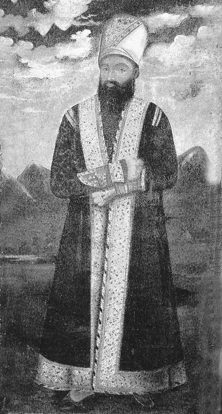
Huseyngulu Khan was born in South Azerbaijan in 1742. He belonged to Goyunli/Govanli tribe of Gajars. Sometimes it is assumed that he was born in Qazvin due to his use of the name Qazvini. However, it is likely that the use of this nickname is related to his victory over Sadiq Khan Shagaghi near Qazvin and his reign there.
His father Muhammad Khan Qajar was a famous general. Place of birth is unknown.
In historical sources, the name of Huseyngulu Khan is mentioned for the first time as a member of the palace in Shiraz, where he worked as a servant. After Fatali Shah ascended the throne, he rewarded Huseyngulu for his loyalty in several ways: he gave him several positions, including the administration of Khorasan, married Huseyngulu’s sister, offered one of Huseyngulu’s daughters to marry the crown prince Abbas Mirza, and married his 29-year-old daughter to Huseyngulu’s son. During the First Russo-Iranian War (1804–1813), the shah needed a strong and loyal commander to protect the Iravan fortress from Russian troops. In 1807, Fatali Shah appointed Huseyngulu khan and commander-in-chief (sardar) of Iravan. A year later, Huseyngulu’s brother, Hasan Khan, who earned the title of “Ser Aslan” due to his bravery, also came to Iravan.
During his 20-year rule, Huseyngulu Khan won the public’s sympathy for his fair administration. Foreign travelers called him one of the most powerful and wealthy rulers, as powerful as the crown prince Abbas Mirza.
Huseyngulu Khan had the right to mint money. He was able to use most of the income for defense purposes. Huseyngulu Khan encouraged trade and established a stable administration. Armenian and Russian sources also confirm that Huseyngulu Khan was a merciful, sincere, noble, honest and fair khan.
On September 1, 1827, Russian troops besieged Sardarabad fortress. Huseyngulu Khan wanted to leave the Iravan fortress to help his grandson, who was guarding the Sardarabad fortress, but the Russian troops did not allow him to do so. He was forced to retreat to the Iran-Turkey border. The defense of the Iravan fortress fell on Hasan Khan. On October 1, Russian troops captured the Iravan fortress. Hasan Khan was captured by the Russians and it was decided to send him to Petersburg to the presence of Emperor Nicholas I. For certain reasons, the carriage carrying Hasan Khan was delayed on the way in the city of Yekaterinograd on the Terek River. However, there was no information about his further fate. Fatali Shah gave Timur’s sword, which he inherited from the Safavids, to Hasan Khan for his bravery during the wars. Lieutenant-General Krasovsky sent that sword of Hasan Khan as a gift to the Emperor.
According to Persian sources, Huseyngulu Khan died in Iran in 1831.



